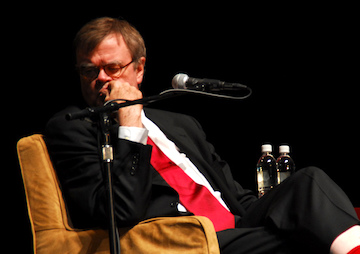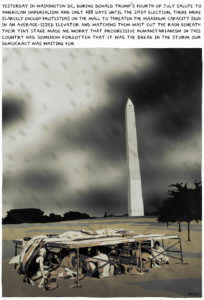 Garrison Keillor. (Trishhhh / CC-BY-2.0)
1
2
3
Garrison Keillor. (Trishhhh / CC-BY-2.0)
1
2
3
But this works with Keillor admiration of “cool.” You want understated bombings and geopolitical machinations. Soft power. Subtle threats, not craven chest-beating. A massive global terror campaign with a pacifistic veneer. You get the blown up limbs and collapsed states that posed an obstacle to U.S. government elite designs without the handwringing. This is far preferable to what gloating or goading people might have engaged in in 1991 or years since.
Along similar lines, another question of mine did get asked when Keillor spoke at the Press Club last year — or rather a neutered piece of it. I asked: “Do you see contradictions of liberalism — from LBJ to today — proclaiming progress but backing wars, bombings, and increasingly presiding over more economic inequality?”
This was notably truncated by the Press Club management (either John Hughes or someone else who passed him my questions) to exclude the reference to wars and bombings: “What is your opinion on liberalism? Do you see contradictions from LBJ to today, proclaiming progress But also increasingly presiding over more economic inequality?” This prompted English major Keillor’s reply: “That is a powerful, complicated sentence. I am not sure I could diagram that sentence. Yes of course there have been changes Since then and defeats. But we don’t have people running for public office against Social Security and Medicare. So that says a lot right there. You can always run against Washington. Welcome to the club. But they don’t get very specific about their plans for entitlement programs. They talk about them sort of vaguely. The things that LBJ and his cohorts have set up seemed fairly durable to me.”
It’s actually the same theme all round. Keillor on his show ignores bombings of several nations by a Democratic president. And the Press Club in their choice of questioning excluded acknowledgement of same.
Keillor did make some reasonable remarks at the Press Club in my view: “We need to take a deep breath and back away from the Middle East. … You can call this isolationism, you can call it ice tea. Whatever.” His reasoning was convoluted, but he got there in ways I won’t pick apart here, but he got there. The funny part is that on the rare occasion I’ve tuned into his show, he’s more likely to be talking about World War I than any of the wars the U.S. government is waging now.
But perhaps the most bizarre answer from Keillor at the Press Club was in response to a question submitted by someone else. They asked if Somali immigrants were not changing the demographics of Lake Wobegon in Minnesota.
Keillor responded: “I don’t know if I should introduce a Somali character and what he or she would do in Lake Wobegon. I could have a Somali woman who could come as an intern to the Lutheran church. That would be interesting. A conversion and a young woman in training to become a pastor. That’s a possibility.”
This was before liberals were aghast at Trump’s remarks about Muslims. But Keillor almost sounded Trumpish in his statements: “We have many listeners among the Somalis to our shows. … We have all these listeners because they can learn English by listening to ‘A Prairie Home Companion.’ We don’t make references to politics on the show.”
See the depraved thought patterns here from a “liberal”: Keillor can seemingly only figure out a way to work a Muslim character into his stories if they decide not to be a Muslim any more. Of course he does politics on his show, he mocks Trump — and in a sense, his very remarks about only having Muslims on if they convert is quite political in the worst way.
Keillor of course expressed sympathy with the Somalis fleeing their “disastrously war-torn country” — but in a horribly familiar pattern, expressed little interest about how it’s managed to say so “war-torn.” Which brings me to a final irony: One of the best analysts on Somalia, Abdi Ismail Samatar, is at the University of Minnesota. Right around the time Keillor was speaking at the Press Club last year, Secretary of State John Kerry was in Somalia and
Samatar told me: “The U.S. should face up to its role in bringing Somalia to its current state. It actually backed the warlords against the Union of the Islamic Courts (UIC), which was trying to bring some stability to the country. In 2005, the UIC defeated the warlords and created peace in Mogadishu for the first time in years and without any help from the international community. Rather than engaging with the UIC, the U.S. and its African clients considered them as terrorists and Ethiopia was given the green light to invade and dismantle it. Ethiopian forces took over Mogadishu on December 25, 2006, and the prospect of a peaceful resurrection of Somalia perished.”
Instead, we see a proliferation of brazen hypocrisies and defacto apologetics for political violence. Do we really need a prophet to see what’s right in front of us?
Osama “Sam” Husseini is a DC-based independent journalist who works as the communications director of the Institute for Public Accuracy.
Your support matters…
Independent journalism is under threat and overshadowed by heavily funded mainstream media.
You can help level the playing field. Become a member.
Your tax-deductible contribution keeps us digging beneath the headlines to give you thought-provoking, investigative reporting and analysis that unearths what's really happening- without compromise.
Give today to support our courageous, independent journalists.
 Garrison Keillor. (Trishhhh / CC-BY-2.0)
1
2
3
Garrison Keillor. (Trishhhh / CC-BY-2.0)
1
2
3






You need to be a supporter to comment.
There are currently no responses to this article.
Be the first to respond.